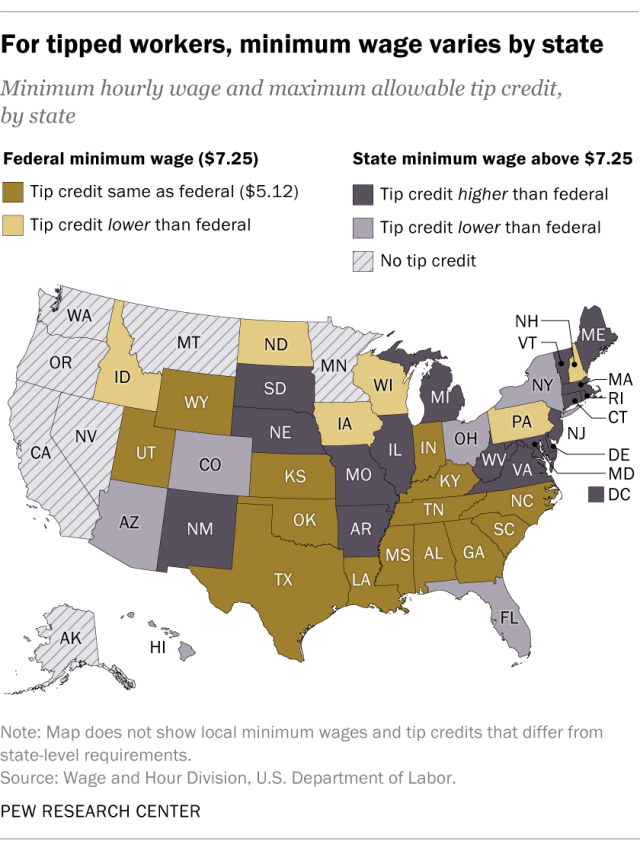Good Policy Does Not Work From the Top

The tipped minimum wage is one of those weird parts of the American economy that almost any progressive policy person hates. It exploits workers, it is deeply unfair within restaurants, it is an anachronism that gets in the way of other, better policy choices. There has certianly been organizing done from restaurant workers around this. That is how Saru Jayaraman got started in her long career as an organizer and she continues to lead on this issue, though now that she’s at UC-Berkeley, she’s a lot less prominent than she was 15 years ago.
But the problem with eliminating the tipped minimum wage as a policy proposal is that a lot of people like it. That includes customers (who frankly often want to lord it over the workers) and the workers themselves, who see themselves as making more money than they would without it. That might be true, it might not be true, but the point is that you can’t create good policy if you haven’t actually organized people around it. Dahlia Tarver has a piece about the recent failure of a campaign to get rid of the tipped minimum wage in Massachusetts in the Prospect.
Last year, the Bay State raised the minimum wage for non-tipped workers to $15 per hour. This year, the Question 5 ballot initiative proposed doing the same for tipped workers who would still be able to earn tips along with that increase. Over the next five years, the minimum wage would be raised and, additionally, all tips would be pooled and split with nonmanagerial restaurant staff, even those who do not directly interact with customers.
On November 5, voters delivered a resounding “no” on Question 5. Only 36 percent of voters supported the initiative, while 64 percent voted against it. It was undoubtedly a disappointing outcome for some, but who exactly was disappointed?
Certainly, the group behind the ballot initiative, One Fair Wage (OFW), a workers’ rights organization based in New York City that works to end subminimum wages for restaurant workers nationwide, was let down by the vote. OFW president Saru Jayaraman said in a statement that the group was up against “millions of dollars in corporate influence, false claims and fear tactics.” The group argued that implementing the higher wage would create a more stable income for servers and reduce sexual harassment in the industry, and vowed to pursue “legislative action and/or future ballot measures.”
The Massachusetts Restaurant Association and Massachusetts Restaurants United and other opponents spent about $3 million campaigning against the initiative. Stephen Clark, the president of the Massachusetts Restaurant Association, had claimed that this proposal would “impact the restaurant owner, who’s going to have higher costs upwards of $18,000 dollars per tip employee to implement this, and it’s going to have a higher cost for the consumer because there’s going to be higher costs.”
Two Massachusetts universities had released separate studies on the ballot initiative—and both studies independently concluded that passing the ballot measure would result in higher wages for tipped workers. In their October report, Jeannette Wicks-Lim, a research professor at the University of Massachusetts Amherst’s Political Economy Research Institute (PERI), and Jasmine Kerrissey, the director of the UMass Labor Center, found that food service employees would likely see between a 10 percent and 20 percent increase in wages.
I feel like this is a metaphor for the entire Democratic Party. Policy experts come up with good ideas. But they try to implement from the top down, without doing the work to actually ask workers what they want. There’s little buy in from the workers. Many workers wonder why people they don’t know are messing with their lives in ways they don’t understand. Sure, groups at the colleges in Amherst and Cambridge have developed these great ideas in touch with their state, on wages and so many other issues, but that’s not organizing. It’s a reliance on expertise, something that is now loathed by many Americans. I myself saw quite a bit of opposition on this while in Massachusetts restaurants and breweries, where I would go before a show or after a hike, both of which I do a lot more in Massachusetts than Rhode Island due to size and availability. So I am not shocked to hear this. And when these things fail, like the election last month, Democrats flail looking for someone to blame–big evil propaganda, or the New York Times, or something else that covers up the fact that they haven’t actually talked to affected people about these issues.
Democrats have done a horrible job of creating the mechanisms for bottom-up organizing. A bunch of leftists in Brooklyn or Chicago or Portland aren’t that much better; the college graduation rate among current DSA members likely approaches 100%. But you know where politics starts? Asking people what they want. That probably should be something Democrats should remember.


